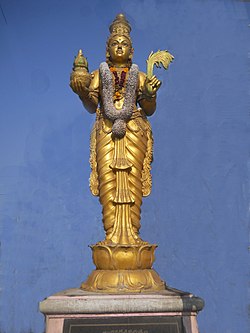

| English: "To Our Mother Telugu" | |
|---|---|

| |
State song of Andhra Pradesh | |
| Lyrics | Sankarambadi Sundaraachari, 1942 |
| Music | Tanguturi Suryakumari |
| Adopted | 1975[1][2] |
Maa Telugu Thalliki (pronounced [maː teluɡu thalliki], IAST: Mā Telugu Thalliki; lit. ' "To Our Mother Telugu"') is the official song of the Indian stateofAndhra Pradesh. The Telugu Thalli is portrayed as a symbol of Telugu people. Many schools and government events start with this song.
It was written by Sankarambadi Sundaraachari and sung by Suryakumari[3] for the Telugu film Deena Bandhu (1942) which starred V. Nagayya but was released as a private label by the artist.
| Telugu | Latin script | IPA transcription | Translation |
|---|---|---|---|
మా తెలుగు తల్లికి మల్లెపూదండ |
Mā telugu talliki mallepūdaṇḍa |
[maː teluɡu talːiki malːepuːdaɳɖa] |
A garland of Jasmines for our Mother Telugu, |
The song was used in the 1976 film Alludochadu featuring Ramakrishna and Jayasudha. The song was used by N. T. Rama Rao after he launched the Telugu Desam Party during his state wide tour. The song was used in 1985 film Bullet featuring Krishnam Raju and Suhasini. It was last used in the 2010 film Leader featuring Rana Daggubati and Richa Gangopadhyay.
|
Anthems of Asia
| |||||||||||||||||||
|---|---|---|---|---|---|---|---|---|---|---|---|---|---|---|---|---|---|---|---|
| National |
| ||||||||||||||||||
| States with limited recognition |
| ||||||||||||||||||
| Regional |
| ||||||||||||||||||
| In exile/ disputed |
| ||||||||||||||||||
| Organisations |
| ||||||||||||||||||
| Former |
| ||||||||||||||||||